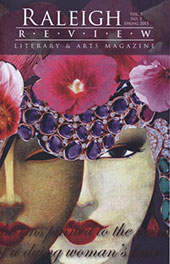 The Raleigh Review Fall 2016 issue features “Red Madonna” by Geri Digiorno on its cover, an appropriate welcome to its contents, which Editor Rob Greene comments: “Many of us enter the arts as a way to heal . . [the arts] is about real people trying to make a better world. We hope the work in this volume guides you a better understanding of humankind.”
The Raleigh Review Fall 2016 issue features “Red Madonna” by Geri Digiorno on its cover, an appropriate welcome to its contents, which Editor Rob Greene comments: “Many of us enter the arts as a way to heal . . [the arts] is about real people trying to make a better world. We hope the work in this volume guides you a better understanding of humankind.”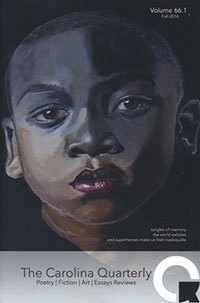 “Jenna’s First” by William Paul Thomas adorns the cover of The Carolina Quarterly Fall 2016, with a full-color portfolio of his work within. “I paint representations of disembodied heads of people in my social circle and sometimes scrawl text directly over their likenesses,” Thomas writes in his Artist’s Statement. “As it relates to my portraits, whatever the viewer derives from looking is the correct interpretation. I embrace symbolic ambiguity while clinging to observational specificity.”
“Jenna’s First” by William Paul Thomas adorns the cover of The Carolina Quarterly Fall 2016, with a full-color portfolio of his work within. “I paint representations of disembodied heads of people in my social circle and sometimes scrawl text directly over their likenesses,” Thomas writes in his Artist’s Statement. “As it relates to my portraits, whatever the viewer derives from looking is the correct interpretation. I embrace symbolic ambiguity while clinging to observational specificity.”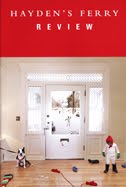 “My work explores narratives that recognize the urgency and conflict in our continuing attempts to connect to the world around us,” writes Hanna Dansie in her Artist’s Statement. Her work is featured both on the cover of the Spring/Summer 2016 Hayden’s Ferry Review and with several internal pages as well.
“My work explores narratives that recognize the urgency and conflict in our continuing attempts to connect to the world around us,” writes Hanna Dansie in her Artist’s Statement. Her work is featured both on the cover of the Spring/Summer 2016 Hayden’s Ferry Review and with several internal pages as well.
NewPages Blog
At the NewPages Blog readers and writers can catch up with their favorite literary and alternative magazines, independent and university presses, creative writing programs, and writing and literary events. Find new books, new issue announcements, contest winners, and so much more!
Amercian Life in Poetry :: Barbara Crooker
American Life in Poetry: Column 601
BY TED KOOSER, U.S. POET LAUREATE
Barbara Crooker, who lives in Pennsylvania, has become one of this column’s favorite poets. We try to publish work that a broad audience of readers can understand and, we hope, may be moved by, and this particular writer is very good at that. Here’s an example from her collection, Gold, from Cascade Books.
Grief
is a river you wade in until you get to the other side.
But I am here, stuck in the middle, water parting
around my ankles, moving downstream
over the flat rocks. I’m not able to lift a foot,
move on. Instead, I’m going to stay here
in the shallows with my sorrow, nurture it
like a cranky baby, rock it in my arms.
I don’t want it to grow up, go to school, get married.
It’s mine. Yes, the October sunlight wraps me
in its yellow shawl, and the air is sweet
as a golden Tokay. On the other side,
there are apples, grapes, walnuts,
and the rocks are warm from the sun.
But I’m going to stand here,
growing colder, until every inch
of my skin is numb. I can’t cross over.
Then you really will be gone.
We do not accept unsolicited submissions. American Life in Poetry is made possible by The Poetry Foundation (www.poetryfoundation.org), publisher of Poetry magazine. It is also supported by the Department of English at the University of Nebraska-Lincoln. Poem copyright ©2013 by Barbara Crooker, “Grief” from Gold, (Cascade Books, 2013). Poem reprinted by permission of Barbara Crooker and the publisher. Introduction copyright ©2016 by The Poetry Foundation. The introduction’s author, Ted Kooser, served as United States Poet Laureate Consultant in Poetry to the Library of Congress from 2004-2006.
Spread the word!
Gina Myers On Writing
 “On Writing” is a series of guest posts written by writers for the Ottawa Poetry Newsletter, curated by Rob McLennan. On Writing #107 features former NewPager and poet Gina Myers. Entitled “Is there room in the room that you room in?,” borrowed from the opening sonnet in Ted Berrigan’s The Sonnets, Myers explores the concepts of community and inclusivity as place in poetry. Read the full post here.
“On Writing” is a series of guest posts written by writers for the Ottawa Poetry Newsletter, curated by Rob McLennan. On Writing #107 features former NewPager and poet Gina Myers. Entitled “Is there room in the room that you room in?,” borrowed from the opening sonnet in Ted Berrigan’s The Sonnets, Myers explores the concepts of community and inclusivity as place in poetry. Read the full post here.
Spread the word!
The Stinging Fly – Summer 2016
The cover of the Summer 2016 issue of The Stinging Fly keeps the waning spirit of summer alive for a little while longer with art by Lizzy Stewart. A bright blue background is adorned by a three-piece cross-section of a girl’s face in profile, the pink insides of her head packed with lush, green plants.
Spread the word!
Saranac Review – 2015
If you’ve not yet been introduced to Saranac Review, consider this your opportunity. Published by the Department of English and its Writing Arts Program of SUNY College at Plattsburgh, I’m not sure what preconceived notions that might give writers and readers, but my first response after reading a good chunk of it was ‘surprising variety.’ Many of the works were surprising—either as non-traditional in their form or in leaving me pleasantly surprised by the feeling of satisfaction at the close of my reading.
Spread the word!
Gargoyle – 2016
Issue 64 of Gargoyle compiles art, nonfiction, poetry and fiction with no overarching theme. Gargoyle lacks an identifiable style, yet boasts memorable content, especially in nonfiction and poetry.
Spread the word!
Lalitamba – 2015
Instead of an editor’s note, Lalitamba begins: “This journal is an offering. May all beings be joyful and free.” Lalitamba (meaning Divine Mother) features nonfiction, fiction, poetry, and art speaking to a diversity of religious and spiritual traditions. Lalitamba opens us up to belief in all its forms, especially our connection to other beings across difference.
Spread the word!
Nimrod International Journal – Spring/Summer 2016
Nimrod International Journal has a history of devoting issues to underrepresented voices; Mirrors and Prisms continues this work, featuring only writers of marginalized sexual orientations and gender identities. But queer authors does not always mean queer subject matter. Editor Elis O’Neal states, “In this issue, you’ll find work on all subjects [ . . . ] we wanted to honor the breadth and depth of writing by our contributors, rather than limit their writing to a single aspect of their lives.” Nimrod takes a person-first approach to queer authorship.
Continue reading “Nimrod International Journal – Spring/Summer 2016”
Spread the word!
Pacifica Literary Review – Summer 2016
Leave logic at the door when you step inside stories laid out for you in this issue of Pacifica Literary Review. They have just enough normality to allow you to accept the absurdities.
Spread the word!
The 3288 Review – Winter 2016
“Authors, take note,” suggests John Gillikin. “Write. Submit. Rinse. Repeat. Hone your craft [and do] not be ashamed of a rejection letter.” This piece of advice appears in a long editorial “From the Corner Office” at the end of the Winter 2016 edition of The 3288 Review, a lit magazine still in its infancy and boldly asserting its preference for works written by West Michigan authors. As a Michigan native myself (though not West Michigan), I was prepared to trudge through yet another literary forest of deer hunting tales, great blue herons reigning over marshlands, lake lore, fish lore, winter lore, how a tree is a metaphor for everything and the spirituality of an autumn leaf, or the typical boy-meets-woods-meets-boy-meets-a new version of himself on the journey and now he has written something equal to Thoreau’s Walden.
Spread the word!
2016 Baltimore Review Print Issue
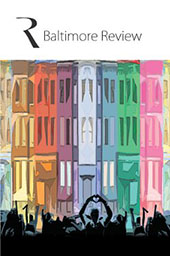 The annual print issue of Baltimore Review allows readers to catch up on a full year of reading in one volume. The 2016 print issue includes poems, stories, and creative nonfiction from the Summer 2015, Fall 2015, Winter 2016, and Spring 2016 online issues, as well as contest winners for the Summer 2015 and Winter 2016 issues.
The annual print issue of Baltimore Review allows readers to catch up on a full year of reading in one volume. The 2016 print issue includes poems, stories, and creative nonfiction from the Summer 2015, Fall 2015, Winter 2016, and Spring 2016 online issues, as well as contest winners for the Summer 2015 and Winter 2016 issues.
Spread the word!
New on NewPages :: September 13, 2016
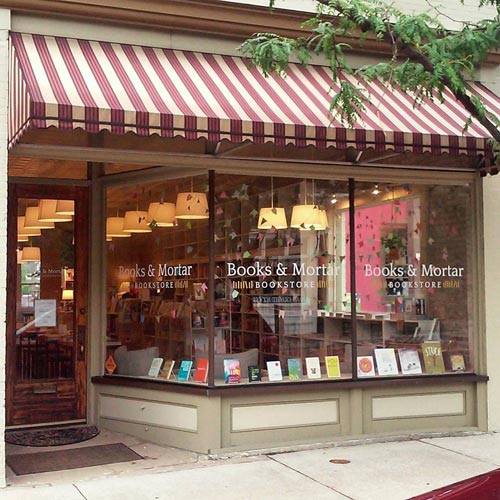 The NewPages Guide to Independent Publishers grew by five today, welcoming Hohm Press, Measure Press, Oneworld Publications, 3 Mile Harbor Press, and SolsticeLit Books (the book publishing arm of Solstice magazine).
The NewPages Guide to Independent Publishers grew by five today, welcoming Hohm Press, Measure Press, Oneworld Publications, 3 Mile Harbor Press, and SolsticeLit Books (the book publishing arm of Solstice magazine).
Bookstore fanatics will find two new independent bookstores, Old Books on Front Street in Wilmington, North Carolina, and Books & Mortar in Grand Rapids, Michigan (shown right).
And finally, readers and writers can find three online literary magazines newly added to our Big List of Lit Mags: Starwheel Magazine, a short-works publication of The Riding Light Review; Cede Poetry, a new Canadian poetry magazine; and Beech Street Review, with submissions currently open for their second issue.
Spread the word!
2015 Boulevard Short Fiction Winner
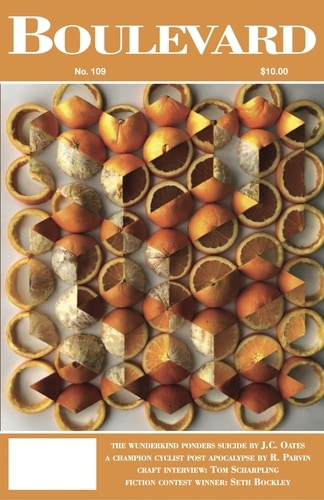 Boulevard #94 features the winner for their 2015 Short Fiction Contest for Emerging Writers who has not yet published a book of fiction, poetry, or creative non-fiction with a nationally distributed press. Joshua Idaszak’s “The Last Laz of Krypton” was awarded $1,500 and publication. Honorable Mention “Mrs. Lana Greer” by Chloe Packer is also included in this issue.
Boulevard #94 features the winner for their 2015 Short Fiction Contest for Emerging Writers who has not yet published a book of fiction, poetry, or creative non-fiction with a nationally distributed press. Joshua Idaszak’s “The Last Laz of Krypton” was awarded $1,500 and publication. Honorable Mention “Mrs. Lana Greer” by Chloe Packer is also included in this issue.
Spread the word!
New on NewPages :: September 12, 2016
Check out the new sites added to NewPages today.
In Literary Links, the Second Hand Stories podcast showcases writing and writers from all around the world, stories read by Jim Szabo and Colleen Stewart. Heartbeat Literary Magazine, on the Big List of Lit Mags, publishes fiction, nonfiction, poetry, and artwork in frequent, online issues.
On the Big List of Alt Mags, find VIDA Review, the newly named section of the VIDA website that features interviews, articles, and essays on intersectional feminist and womanist thinking.
New on the Publisher’s Guide, Nomadic Press publishes chapbooks, fiction, nonfiction, and poetry; and in Independent Bookstores, Wisconsin sees the addition of Downtown Books – Bought & Sold, a used bookstore located in Milwaukee.
And of course, it’s a Monday, so our Magazine Stand features blurbs of fresh, new magazines issues.
Spread the word!
Lit Mag Covers :: Picks of the Week
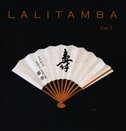 Lalitamba, which means Divine Mother, calls itself a “journal of international writings for liberation” and was inspired by a pilgrimage through India. Each issue, the cover is meditaion on the publication’s focus and inspiraiton. [No photo credit.]
Lalitamba, which means Divine Mother, calls itself a “journal of international writings for liberation” and was inspired by a pilgrimage through India. Each issue, the cover is meditaion on the publication’s focus and inspiraiton. [No photo credit.]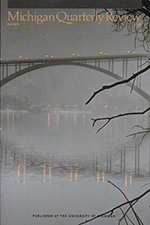 Michigan Quarterly Review Summer 2016 cover photo is a rich perspective on the beauty of summer. “A Patch of Green” photo by MIchael Owen, 2014.
Michigan Quarterly Review Summer 2016 cover photo is a rich perspective on the beauty of summer. “A Patch of Green” photo by MIchael Owen, 2014.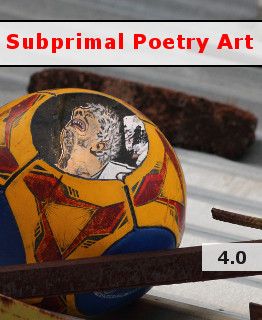 Cynthia Low’s artwork appears both on the cover and is featured inside Subprimal Poetry Art, an online journal. See the full print and Low’s commentary here.
Cynthia Low’s artwork appears both on the cover and is featured inside Subprimal Poetry Art, an online journal. See the full print and Low’s commentary here.
Spread the word!
Rattle Tribute to Adjuncts
 In addition to work by 17 poets that opens the issue, Rattle #53 features a Tribute to Adjuncts. The editors write, “Over 65% of U.S. college faculty now work as adjuncts, facing low wages, limited hours, and high instability. We wanted to highlight their writing, while also showing support for recent efforts at gaining better treatment by the university system. As always, the goal was to show the wide range of creative work that the featured group is producing, so while many poems address their careers, others cover a variety of subjects. All of them share their thoughts on adjuncting in the contributor notes section.”
In addition to work by 17 poets that opens the issue, Rattle #53 features a Tribute to Adjuncts. The editors write, “Over 65% of U.S. college faculty now work as adjuncts, facing low wages, limited hours, and high instability. We wanted to highlight their writing, while also showing support for recent efforts at gaining better treatment by the university system. As always, the goal was to show the wide range of creative work that the featured group is producing, so while many poems address their careers, others cover a variety of subjects. All of them share their thoughts on adjuncting in the contributor notes section.”
Every one of us who teaches in higher ed should buy copies of this issue to give to our dean, provost, vice president, president. board of trustees – whomever is responsible for the decision-making that retains, and continues to increase, these miserable working conditions for adjunct faculty. Perhaps better still, assign this issue in your classes, have students read it; the real change will need to come from dissatisfied “customers.” If they are outraged about egregious labor practices and refuse to buy their products from certain companies, they should be as equally outraged about the education for which they are paying a premium price to support an oppressed working majority. [Rattle cover artist Allison Merriweather]
Spread the word!
Fiddlehead Summer Poetry 2016 Issue
If you want a concentrated dose or a total immersion introduction to Canadian poetry, then The Fiddlehead Summer Poetry 2016 issue (#268) is for you. But, don’t think it’s all-Canada all the time, as Editor Ross Leckie writes, “A big part of what we do at The Fiddlehead is to place the best of Canadian writing in the context of international work, and that is the motivation for our retrospectives with new poems. We present this year Mary Jo Salter and Les Murray. We have also included our old friend Charles Wright and the magnificent poet Thylias Moss.” Mary Jo Salter offers 26 pages of poetry as well as her own introduction.
Spread the word!
Books :: September 2016 Award-Winning Titles
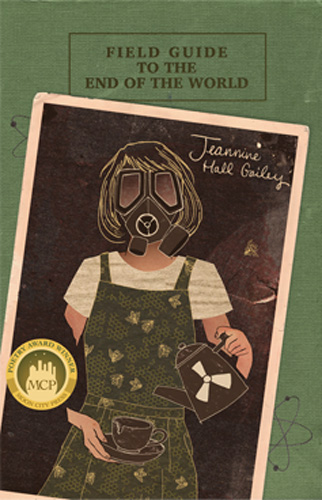 September seems to be the month for award-winning book releases. This month, find the winners of Moon City Press’s 2015 Moon City Poetry Award, the 2015 The American Poetry Review/Honickman First Book Prize, and The University of Tampa Press’s 2015 Anita Claire Scharf Award.
September seems to be the month for award-winning book releases. This month, find the winners of Moon City Press’s 2015 Moon City Poetry Award, the 2015 The American Poetry Review/Honickman First Book Prize, and The University of Tampa Press’s 2015 Anita Claire Scharf Award.
Jeannine Hall Gailey brought home the Moon City Poetry Award with her fifth collection Field Guide to the End of the World, with a cover designed by the talented Charli Barnes (shown on the right). The poetry collection “delivers a whimsical look at our culture’s obsession with apocalypse.” Readers can pre-order copies from The University of Arkansas Press.
Likenesses by Heather Tone was chosen by Nick Flynn as the winner of The American Poetry Review/Honickman First Book Prize. Flynn says Likenesses, is an origin myth in its “attempts to create a world by naming it.” Copies of Tone’s first full collection of poetry will be distributed by Copper Canyon Press.
Patricia Hooper, the author of three previous books of poetry, received the Anita Claire Scharf Award, winners selected by the editors of the Tampa Review from among the manuscripts submitted to the annual Tampa Review Prize for Poetry. Hooper’s collection, Separate Flights, “quite literally lifts off,” says Tampa Review Editor Richard Mathews, and is “musical and powerful in its impact.”
Check out these three award-winning poetry books, all hitting shelves sometime this month.
Spread the word!
DWW MacGuffin Poetry Prize Winners
The Spring-Summer 2016 issue of The MacGuffin features the winners of the Detroit Working Writers MacGuffin Poetry Prize. This annual competition is open to DWW members as well as Michigan writers, from new to established. This year’s first place winner is “The Mathematician’s Daughter” by Alexander Payne Morgan, and Diana Dinverno won both 2nd prize with “The World Spins” and 3rd prize with “Letting Go.”
Spread the word!
Books :: 2015 Michael Waters Poetry Prize
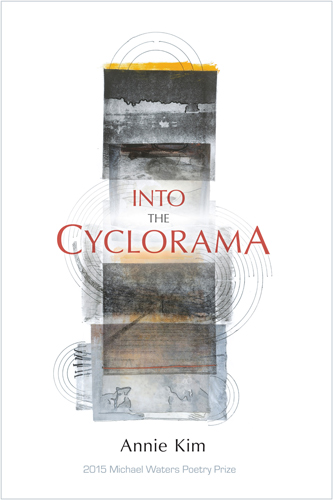 At the end of the year, find Annie Kim’s Into the Cyclorama, winner of Southern Indiana Review’s 2015 Michael Waters Poetry Prize.
At the end of the year, find Annie Kim’s Into the Cyclorama, winner of Southern Indiana Review’s 2015 Michael Waters Poetry Prize.
From back of the book:
We enter works like the 19th-century Gettysburg Cyclorama at the heart of this book, asking: What art can we make out of violence? What shape from loss? Like snow that leaves no trace in the photographed garden, Into the Cyclorama answers: Form is everything, even at its most transient.
Preparing for December, when the poetry collection will be released, readers can check out the Southern Indiana Review website where they’ll find sample poems, a link to Annie Kim’s website, and an interview with the poet conducted by Michael Collins.
Spread the word!
WLT Writing from the Gulf of Mexico
The September-October 2016 issue of World Literature Today includes the special section, “Writing form the Gulf of Mexico.” Starting with an introduction by Dolores Flores-Silva, the feature includes: poetry by Jesús J. Barquet, Charo Guerra, Jay Wright, Luis Lorente, Brenda Marie Osbey, José Luis Rivas; audio poetry by Feliciano Sánchez Chan; prose by Bárbara Renaud González, Agustín del Moral Tejeda, and LeAnne Howe; and an interview with Agustín del Moral Tejeda by Dolores Flores-Silva. Many of the pieces are availble to read (limited access for non-subscribers) in full or excerpted online.
Spread the word!
The Haunting of the Mexican Border
The Haunting of the Mexican Border: A Woman’s Journey by Kathryn Ferguson is written at eye-level. The book’s first half are the stories of the young author when, in her twenties her parents die, she realizes she is free to do whatever she wants. She grew up in Tucson, Arizona, sixteen miles from the Mexico border with fond memories of many childhood family day trips to Mexico. At that time the border was relatively unpopulated and the US government lax about Mexican migrants coming to the US to work and going back home to be with their families. Working at PBS TV, a dream was born in her to do a film of Mexico. She and a friend drove south into Mexico’s Sierra Madre open to what presented itself for a film. On one of the scouting trips, she and her friend reached nightfall. A lone man, wearing a red head band, and his son were walking the dirt road. She leaned out the car window and asked him where a good place was to put down their sleeping bags for the night. He took them to his home to stay with his family and becomes her friend for life. He is a Rarámuri, descendent of the Native Americans who had escaped the Conquistadors into the rugged Sierra Madras and retained their independence and customs. The contemporary story of the Rarámuri, told through three rituals, was her first film.
Spread the word!
The Best Small Fictions 2016
The word “small” often tends to denote something insignificant, something easily overlooked. The Best Small Fictions 2016, guest-edited by Stuart Dybek, completely obliterates that notion: there is nothing insignificant about these small stories. They boom and jump off the page, impossible to ignore.
Spread the word!
Rust Belt Boy
Rust Belt Boy: Stories of an American Childhood is an outstanding portrait of Ambridge, Pennsylvania, a steel town which, like so many similar communities, helped shape and build the working America we know today. Gentle and loving, Paul Hertneky pays homage to the hometown he desired to leave for greater, unknown places. Hertneky’s descriptions left me yearning to travel to a version of the city that only exists in history books and his memoir.
Spread the word!
The Yesterday Project
Ben and Sandra Doller dive straight into a foreboding and brutally honest real-life account of their cohabitation with their newest roommate, cancer. The Yesterday Project was co-written by the Dollers in the wake of a life-threatening diagnosis: melanoma cancer, stage 3. The project lasts a total of 32 days with each writer taking a moment each day to go back and recollect the previous day’s experiences.
Spread the word!
Where We Go When All We Were Is Gone
Where We Go When All We Were Is Gone is a twelve story collection that throws readers headlong into the deepest depths of the human heart. Each story explores the real life vulnerability people deal with in their darkest hours while seamlessly enchanting the reader with characters that are magically fantastic. Readers will find themselves lost in the mix of these lovely yet terrifying stories.
Spread the word!
Creating Nonfiction
You may have noticed that today’s personal essays are rarely defined by the five-paragraph model—intro, three body paragraphs, conclusion—that is generally taught in English composition classes. What remains standard, though, is the significance of the personal element. Creating Nonfiction: Twenty Essays and Interviews with the Writers exhibits wonderful examples, and the interviews are enough to encourage current and future essayists to keep writing.
Spread the word!
The Detective’s Garden
Prowl around Brooklyn back in 1995 and you’ll catch retired homicide detective Emil Milosec digging in his garden—well, actually, his late wife’s garden. What he unearths is a woman’s pinkie finger and an opal ring. The ring belonged to his wife. The finger didn’t. Such is the premise for Janyce Stefan-Cole’s novel, The Detective’s Garden: A Love Story and Meditation on Murder.
Spread the word!
Available Light
Available Light: Philip Booth and the Gift of Place is as much a travelogue of picturesque Maine, and especially the town of Castine, as it is a biography of the late poet Philip Booth. In Jeanne Braham’s tidy book, the town and the poet are pretty much inseparable.
Spread the word!
Books :: 2016 Rattle Chapbook Prize Winner
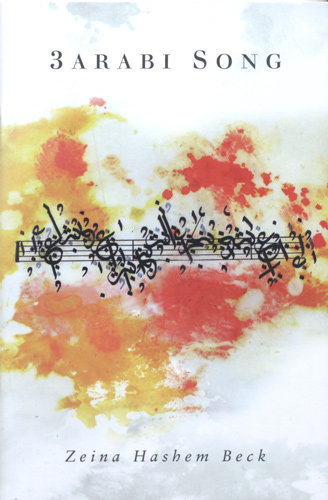 If anyone needs more encouragement to subscribe to your favorite literary magazines, Rattle’s latest issue to subscribers serves as a reminder.
If anyone needs more encouragement to subscribe to your favorite literary magazines, Rattle’s latest issue to subscribers serves as a reminder.
Included in the package for Issue 53 (which features a tribute to 22 adjunct instructors) is a complimentary copy (regularly $6.00) of the 2016 Rattle Chapbook Prize Winner: 3arabi Song by Zeina Hashem Beck.
From Rattle’s website:
3arabi Song is a song of sorrow and joy, death and dance. Yes there is unrest, war, and displacement in countries like Lebanon, Syria, Palestine, Iraq, and Egypt. But there is also survival, music, and love.
Also on the website, find sample poems, including a recording of Zeina Hashem Beck performing a poem with the Fayha Choir. And while you’re there, don’t forget to subscribe to Rattle.
Spread the word!
Sonic Boom Senryu Contest Winners
The August 2016 issue of Sonic Boom includes the winners of their second annual senryu contest selected by Judge Terri L. French from 123 participants from 27 countries.
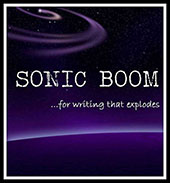 First Place
First Place
Steve Hodge, USA
Second Place
Sidney Bending, Canada
Third Place
Chase Gagnon, USA
Honorable Mentions
Mohammad Azim Khan, Pakistan
Phyllis Lee, USA
All the winning entries as well as judge’s comments can be read here.
Spread the word!
TriQuarterly and the Video Essay
TriQuarterly, taking full advantage of its online format, several years ago began featuring video essays in each issue. The editors commented that it was “an emerging form Marilyn Freeman described as ‘the mixed-breed love child of poetry, creative nonfiction, art house indies, documentary, and experimental media art.’ At its core the video essay is, like its print counterpart, an attempt to figure something out.” The most recent issue of TriQuarterly features video essays by Ander Monson, Blair Braverman, and Heather Hall.
Spread the word!
NOR Shakespeare Issue
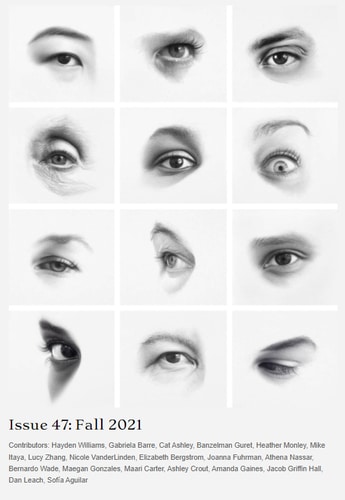 The newest issue of New Orleans Review is a special tribute to Shakespeare. According to Guest Editor Hillary Eklund, “The primary motivation for this issue is that 2016 marks the 400th anniversary of William Shakespeare’s death, and we wanted to commemorate that by looking at Shakespeare’s 21st century literary afterlives.”
The newest issue of New Orleans Review is a special tribute to Shakespeare. According to Guest Editor Hillary Eklund, “The primary motivation for this issue is that 2016 marks the 400th anniversary of William Shakespeare’s death, and we wanted to commemorate that by looking at Shakespeare’s 21st century literary afterlives.”
The original call for submissions was: “Four centuries after William Shakespeare’s death, his name ennobles a variety of cultural institutions, from libraries and endowed chairs to summer camps and rubber duckies. Even as these structures—both lofty and lowly—rise and fall, we bear witness to the greatest power Shakespeare described: that of poetry itself to preserve without rigidity, to endure without sameness, and to inspire without dominance. Beyond the array of institutions that bear his name, what conversations do Shakespeare’s eternal lines animate now?”
“We welcomed submissions that riff on, respond to, reimagine, or recast any of Shakespeare’s works in any genre,” says Eklund, “including short fiction, poetry, image/text collections, creative nonfiction, and scholarship. The response was great. We had submissions from poets, fiction writers, essayists, and scholars. We especially relished the opportunity to put creative work in direct conversation with scholarly work; few journals have the license to do that, and the result is, I think, quite exciting.”
 Eklund herself is a scholar of early modern literature and Associate Professor of English at Loyola University New Orleans. She has published articles and chapters in Shakespeare Studies and in essay collections on early modern literature. Her book Literature and Moral Economy in the Early Atlantic: Elegant Sufficiencies came out in 2015 with Ashgate Press, and she has a collection of essays, Groundwork: English Renaissance Literature and Soil Science, forthcoming from Duquesne University Press.
Eklund herself is a scholar of early modern literature and Associate Professor of English at Loyola University New Orleans. She has published articles and chapters in Shakespeare Studies and in essay collections on early modern literature. Her book Literature and Moral Economy in the Early Atlantic: Elegant Sufficiencies came out in 2015 with Ashgate Press, and she has a collection of essays, Groundwork: English Renaissance Literature and Soil Science, forthcoming from Duquesne University Press.
When I asked about the experience of editing this issue, Eklund responded: “The experience has helped me to focus the chatter around Shakespeare, who this year more than ever seems to be everywhere, and I hope it will have a similar effect on our readers. As we take stock of the many commemorations and celebrations of Shakespeare in 2016, the pieces in this issue help us think through the question of what we gain from Shakespeare today – what, if anything, reading or thinking about Shakespeare is good for. Some of our contributors have taken up Shakespeare’s enduring themes and respun them in modern contexts. Others have used contemporary contexts to rethink some of the problems Shakespeare’s work presents, particularly problems of gender and race.”
Spread the word!
Books :: 2015 Pleiades Press Editors Prize
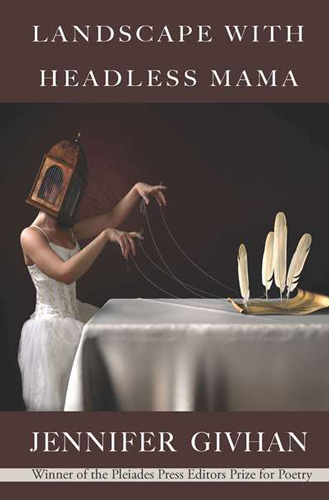 Forthcoming in October is Jennifer Givhan’s Landscape with Headless Mama, winner of the Pleiades Press Editors Prize for Poetry. The collection “explores the experiences of becoming and being a mother through the lens of dark fairy tales,” and is described by Givhan as “a surreal survival guide.”
Forthcoming in October is Jennifer Givhan’s Landscape with Headless Mama, winner of the Pleiades Press Editors Prize for Poetry. The collection “explores the experiences of becoming and being a mother through the lens of dark fairy tales,” and is described by Givhan as “a surreal survival guide.”
Copies are available for pre-order from the Pleiades Press website, as well as more information about Landscape with Headless Mama.
Spread the word!
Books :: How Punny
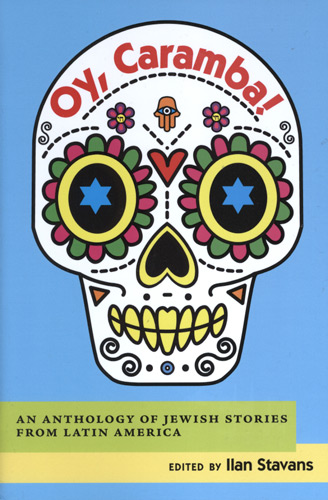 Who doesn’t appreciate a good play on words? The University of New Mexico Press has announced an anthology forthcoming in September, edited by Ilan Stavans, with a title that tickled my pun fancy.
Who doesn’t appreciate a good play on words? The University of New Mexico Press has announced an anthology forthcoming in September, edited by Ilan Stavans, with a title that tickled my pun fancy.
The anthology of Jewish stories from Latin America is titled Oy, Caramba!, and put a smile on my face the moment it arrived. Even the bright, eye-catching cover mixes the Jewish and Latin American cultures: a sugar skull decorated with a hamsa, Chai symbols, and the Star of David.
First published in 1994 as Tropical Synagogues: Short Stories by Jewish-Latin American Writers, the anthology returns next month, expanded and updated.
Check out the UNM Press website for more information.
Spread the word!
Main Street Rag 20th Anniversary
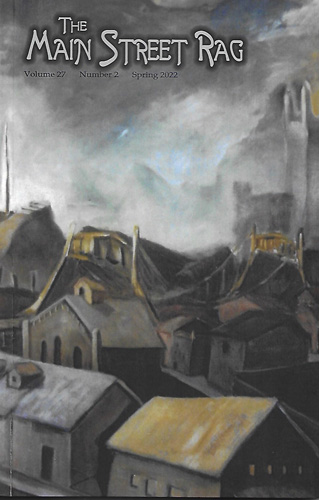 In his Welcome Readers Summer 2016 column, Editor M. Scott Douglass begins, “It may have gone unnoticed since we didn’t make a fuss about it, but The Main Street Rag recently experienced a milestone.” Having started in May of 1996, that milestone is 20 continuous years of publishing MSR, beginning as Main Street Rag Poetry Journal. “We’ve gone through many changes,” Douglass writes, “taken advice from notable people like Dana Gioia who advised me to diversify our content and broaden our audience. We did and it did. So did the workload.”
In his Welcome Readers Summer 2016 column, Editor M. Scott Douglass begins, “It may have gone unnoticed since we didn’t make a fuss about it, but The Main Street Rag recently experienced a milestone.” Having started in May of 1996, that milestone is 20 continuous years of publishing MSR, beginning as Main Street Rag Poetry Journal. “We’ve gone through many changes,” Douglass writes, “taken advice from notable people like Dana Gioia who advised me to diversify our content and broaden our audience. We did and it did. So did the workload.”
Douglass comments on the efforts of many committed individuals who have supported the publication through the years – with blood, sweat and tears, and “who work specific projects for cheap, sometimes for beer and/or Chinese food.” Sounds like literary publishing as we know it. But Douglass has built quite a publishing house, producing “as many as 200 titles in a single year, but now averages between 100 and 120 titles per year, when you include our titles, this literary magazine and those we produce for others, and the books we produce as a contractor.”
I’m sure there are hundreds of individuals, if not in the thousands by now, who owe some thanks to The Main Street Rag for having given them the opportunity to be published and read, and certainly in those thousands, those who have appreciated being able to read from this publishing house over the past 20 year. MSR has been a mainstay in the literary community. We congratulate them on two great decades of dedication and commitment to literary publishing, and wish them many, many more years of good work.
Spread the word!
Georgia Review Feature :: Coleman Barks
 The Summer 2016 issue of The Georgia Review includes a special feature on Coleman Barks. In addition to an introduction by Editor Stephen Corey, the section includes several poems and a prose piece by Barks. The prose, an essay titled “Figures from My Boyhood,” begins, “Steve Corey asked me to do a prose piece (on my influences, he suggested) for The Georgia Review. But I seem to have more energy for childhood obsessions. Sorry to be so self-absorbed.” Exactly what we would expect from Barks.
The Summer 2016 issue of The Georgia Review includes a special feature on Coleman Barks. In addition to an introduction by Editor Stephen Corey, the section includes several poems and a prose piece by Barks. The prose, an essay titled “Figures from My Boyhood,” begins, “Steve Corey asked me to do a prose piece (on my influences, he suggested) for The Georgia Review. But I seem to have more energy for childhood obsessions. Sorry to be so self-absorbed.” Exactly what we would expect from Barks.
Other authors whose works in tribute to Barks are included: Ty Sassaman, Hugh Ruppersburg, Jody Kennedy, Ravi Shankar, John Yow, Norman Minnick, Gulnaz Saiyed, Naomi Shihab Nye, Lisa Starr, and Gordon Johnston. Several of the works, including one of Barks poems, can be read online here.
Spread the word!
The Meadow 2016 Novella Contest Winner
 The Meadow 2016 Novella Prize winner is “The Spider” by Mark Brazaitis [pictured] and can be read both in the print issue as well as online. Brazaitis is the author of six books, including The Incurables: Stories, which won the 2012 Sullivan Prize in Short Fiction and the 2013 Devil’s Kitchen Reading Award. His latest book, Truth Poker: Stories, won the 2014 Autumn House Press Fiction Competition. The Meadow is the annual literary and arts journal of Truckee Meadows Community College in Reno, Nevada.
The Meadow 2016 Novella Prize winner is “The Spider” by Mark Brazaitis [pictured] and can be read both in the print issue as well as online. Brazaitis is the author of six books, including The Incurables: Stories, which won the 2012 Sullivan Prize in Short Fiction and the 2013 Devil’s Kitchen Reading Award. His latest book, Truth Poker: Stories, won the 2014 Autumn House Press Fiction Competition. The Meadow is the annual literary and arts journal of Truckee Meadows Community College in Reno, Nevada.
Spread the word!
The Malahat Review 2016 Novella Prize Winner
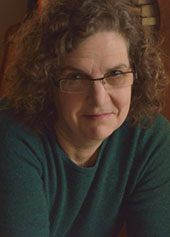 The Malahat Review #195 features Anne Marie Todkill’s story “Next of Kin,” winner of the 2016 Novella Prize. Todkill’s entry was chosen from 225 submissions by three final judges: Mark Anthony Jarman, Stephen Marche, and Joan Thomas. She has been awarded $1,500 in prize money and publication.
The Malahat Review #195 features Anne Marie Todkill’s story “Next of Kin,” winner of the 2016 Novella Prize. Todkill’s entry was chosen from 225 submissions by three final judges: Mark Anthony Jarman, Stephen Marche, and Joan Thomas. She has been awarded $1,500 in prize money and publication.
Of “Next of Kin,” the judges said: “With its controlled reveal of complications, it has the drive of a mystery story—but the mystery under investigation is the intricacies of a family over time. Anne Marie Todkill is an accomplished writer, offering surprising and astute insights into the relationship between sisters. Her dialogue is sharp and she is especially incisive in writing about sex. Her narrator Marian speaks with a knowing voice, at odds with her ‘small life’; the things she withholds come to the reader as a series of small explosions. Todkill imposes no pattern over events and offers her characters no epiphanies. Instead, incidents refract off each other and the story speaks powerfully through its silences. Like all good novellas, ‘Next of Kin’ offers both the concentrated pleasures of a short story and the scope of a novel.”
Read an interview with the Anne Marie Todkill here.
Spread the word!
Cuban & Cuban-American Writers & Artists
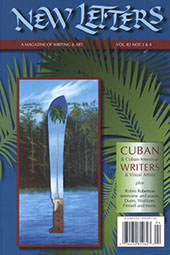 The newest issue of New Letters (v82 nos 3 & 4) includes a special section of Cuban & Cuban-American Writers & Artists co-edited with Mia Leonin, author of Braid (Anhinga Press) and Unraveling the Bed (Anhinga Press), and a memoir Havana and Other Missing Fathers (University of Arizona Press). Leonin currently teaches creative writing at University of Miami. The introductory note by Editor Robert Stewart reads:
The newest issue of New Letters (v82 nos 3 & 4) includes a special section of Cuban & Cuban-American Writers & Artists co-edited with Mia Leonin, author of Braid (Anhinga Press) and Unraveling the Bed (Anhinga Press), and a memoir Havana and Other Missing Fathers (University of Arizona Press). Leonin currently teaches creative writing at University of Miami. The introductory note by Editor Robert Stewart reads:
“Humans don’t wait for revolution or democracy in order to live their lives,” says Mia Leonin…Her point underscores both the force of literature and art, and the hope found there. The impulses to generalize about certain groups, to categorize and perhaps condemn–to indulge in the quality of discourse imposed on us by many critics and politicians–find their antidote in literature. “The poems, stories, and essays in these pages,” Leonin continues, “remind us that Cuba is not an idea or ideology, a photo op or a news line. Likewise, its diaspora is neither offshoot nor derivative. Whatever its temporality, literature is the present moment unfolding, and these writers carve out each moment with authenticity and vision.”
Authors and artists whose works are featured: Chantel Acevedo, Alfredo Zaldivar, Ruth Behar, Lisiette Alonso, Cristina Garcia (“Berliners Who, two stories” can be read here), Orlando Ricardo Menes, Ana Menendez, Laura Ruiz Montes, Pablo Medina.
A Mariel Epistolary, fiction
, Chantel Acevedo
Utopias, poems, translated by Margaret Randall
, Alfredo Zaldivar
For Three Months I Am Alone in La Habana, poem in English & Spanish
, Ruth Behar
Three Poems
, Lisiette Alonso
, Cristina Garcia
Two Poems
, Orlando Ricardo Menes
Two Essays: The Rooster That Attacked My Sister & Wandering Creatures
, Ana Menendez
Two Poems, trnaslated by Margaret Randall
, Laura Ruiz Montes
That Dream Again
, Pablo Medina
Spread the word!
Water~Stone Review – 2015
If I had to pick one word to describe Water~Stone Review #18 it would be: Story. Regardless of genre, nearly every piece in this issue has some sense of narrative, of back story, of foreshadowing; there are stories told to us, shown through careful detail, and trolled through symbolic imagery by the many authors in this hefty annual—which is a factor also worth note. The editors of Water~Stone have a unique sensibility in their selections as an annual publication. It’s almost a shame from the review standpoint to have to read the entire publication in a short period of time, because I felt I should slow down and let each piece sink in before moving on and, in some cases, reread and re-reread works that deserve the attention—even with so much new waiting to be read. That speaks to good submissions as well as good editing in selection.
Spread the word!
weirderary – June 2016
weirderary is that kid in high school who, when called weird, would smile proudly and say, “Thanks.” weirderary is the weird things you do at home when you think no one’s watching. weirderary is exactly the kind of read I’ve been looking for.
Spread the word!
West Marin Review – 2015
West Marin Review’s 2015 issue Editor’s Note draws attention to the journal’s lack of overall theme, though readers will quickly see Volume 6 is tied together by the social climate and by strong, absorbing writing, with lots to love in both poetry and prose.
Spread the word!
Creative Nonfiction – Spring 2016
This issue of Creative Nonfiction focuses on the sacrament of marriage. But if you think you’re in for an issue of romantic tales and happily-ever-afters, keep in mind that this magazine is nonfiction. While the wedding itself and much of a marriage can be happy, real life happens, and like anything lasting or worthwhile, it has its ups and downs. This issue explores many angles of marriage including “non-traditional” marriages, spur-of-the-moment marriages, fifth marriages, same-sex marriages, marriages that work, those that don’t. Paul Roden and Valerie Lueth’s (of Tugboat Printshop) beautiful and intricate woodcut prints are featured throughout the issue to tie it all together.
Spread the word!
Passages North – 2016
Passages North is a vade mecum. A canon. A bible for literati. An authority. A serious digest. A volume that induces wallet-cracking extra-baggage charges. This annual journal sponsored by Northern Michigan University publishes short stories, fiction flashes, modular and traditional essays, and poetry—loads and loads of poems of every possible breed: ghazals, sonnets, pantouns, free-verse, coupleted-cantations—diversity in form, theme and content receive open-armed welcomes at Passages North. From Pushcart winners to first-timers, from experimental to toe-the-liners, this volume is hefty hefty hefty, and by following the editorial compass of publishing only what deserves “merit,” they have produced a book to please the masses. If you can’t find something that thrills and rocks your sacrum, email me, and I’ll give you the number of my therapist, or maybe we can photoshop your name onto my prescriptions.
Spread the word!
River Teeth – Fall 2015
“My mother taught me that the dead are among us—look closely and you’ll begin to notice them everywhere . . . The world is full of codes and keys, maps and legends. You wake up one morning, and ask yourself, How is it all connected? The question haunts you for the rest of your life.” (Karen Dietrich’s “Air and Water”). Here lies one of my favorite passages from this issue of River Teeth, a collection of creative nonfiction. And how is this writing all connected? It is, after all, deemed worthy to all fall beneath the same covers. I think it’s the human experience, and the raw need to make an understanding of life’s experiences and mysteries.
Spread the word!
2016 Willow Springs Fiction Winner
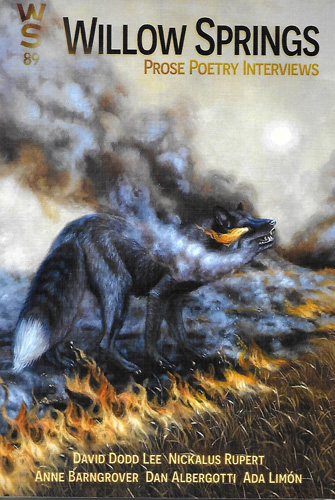 This year’s winner of the Willow Springs Fiction is “Gorilla Love Story” by Chelsea Bryant. The award provides each entrant with a one-year subscription to the publication; the winner receives $2000 + publication in the annual June issue. Willow Springs offers some of their publication’s content for online reading along with comments from the author about the work.
This year’s winner of the Willow Springs Fiction is “Gorilla Love Story” by Chelsea Bryant. The award provides each entrant with a one-year subscription to the publication; the winner receives $2000 + publication in the annual June issue. Willow Springs offers some of their publication’s content for online reading along with comments from the author about the work.
[Cover image by Marta Berens from Dream Chapter]
Spread the word!
The Poetry Marathon is Complete
 Just like the foot race marathon, you don’t get bragging rights until you actually do it. And, appropriately, this year’s Poetry Marathon took place during the summer Olympics. So while I was toiling away at my poetry prompts and posting poems to the official marathon blog, runners from around the world were competing for gold, silver and bronze medals in Rio.
Just like the foot race marathon, you don’t get bragging rights until you actually do it. And, appropriately, this year’s Poetry Marathon took place during the summer Olympics. So while I was toiling away at my poetry prompts and posting poems to the official marathon blog, runners from around the world were competing for gold, silver and bronze medals in Rio.
Unlike the Olympics, the Poetry Marathon is an annual event. I originally posted on it here, and the PM website offers a complete history and FAQ of the event. While I’ve known about the event for several years, this is the first year I participated. Luckily for me (and many others), the organizers have created a half marathon, which is what I completed. Both marathons start at 9:00am ET on writing day (Aug 13 this year), then every hour for 12 or 24 hours, participants are expected to write a poem and post it to the PM website. Each participant gets their own login on a group WordPress site, then as each participant publishes a poem, which is housed on their own blog space, it is also posted to the whole group blog. If you look at the site now, what you see are the poems posted by the participants as they came in.
If this sounds like a big commitment of a day, it is – or it can be. The organizers are flexible in letting participants commit to (on their honor) writing one poem every hour and then posting them when they can get to a computer. Some participants commented on having to go to work, so while they were writing the poems, they wouldn’t be posting them until later. Even for me, with a day “off,” I couldn’t be at the computer every hour of the day.
Bottom line: Was it fun? Was it engaging? Was it worthwhile? Yes, yes, and yes. Would I do it again? Absolutely. Until you do it, you don’t quite “get it.” Write a poem an hour? Anyone can do that on their own. But it was motivating (even a bit demanding) being in the community, committed to having to publish poems up to the website, having to be responsible every hour of the day. In fact, even while I was just sitting working at the computer, I almost missed one of the hours because I was so caught up in my work. I realized it with only five minutes left in the hour and scrambled to catch up! The pressure! It was wonderful. As were the prompts, which the organizers provide at the top of every hour. I admire those writers who had their own ideas for poems, but I relied heavily on the prompts to give me something to write about and get the writing done. There were many who did the same, and it was engaging to see the various interpretations of the prompts – a lot of really creative writers.
When it was done – 12 hours and 12 poems later – I felt a deep sense of pride and accomplishment. Not that I believe I wrote 12 astonishing poems that will shake the world. But because I wrote 12 poems in 12 hours as part of a community of people who were just as eager and committed as me. Surrounded for a whole day by an entire community of poets – reading, writing, commenting, and then doing it all over again, and again, and again. I think immersion is the right word.
I also learned that not everyone will be able to appreciate the experience if you try to share your joy at the accomplishment. “I just finished a poetry half marathon!” I exclaimed to my husband as I walked away from the computer at 9:00pm after just having posted my final poem. “Okay,” he said, not turning away from his laptop.
What you get out of it is definitely personal. Unlike the foot race, and unlike the Olympics, there aren’t throngs of people cheering your completion, no competitors there to hug you for a good race won. Though the organizers and participants do post encouraging comments for one another and have chat groups running to motivate one another, in the end, the sense of whatever it has meant to you will be completely up to you to generate and to own.
I thoroughly enjoyed the experience, I was challenged, I accomplished my goal, and I hope to be back to do it again next year.
Thank you Poetry Marathon! Congratulations to everyone who completed the half 12 hours of writing and the full 24 hours of writing. I get it: You are amazing!
[Applause]
Spread the word!
Lit Mag Covers :: Picks of the Week
 This week’s covers just say “summer” to me, starting with this Spring 2016 issue of River Teeth: A Journal of Nonfiction Narrative. The cover photo is of Chipmunk Creek, Richland County, OH by David FitzSimmons.
This week’s covers just say “summer” to me, starting with this Spring 2016 issue of River Teeth: A Journal of Nonfiction Narrative. The cover photo is of Chipmunk Creek, Richland County, OH by David FitzSimmons.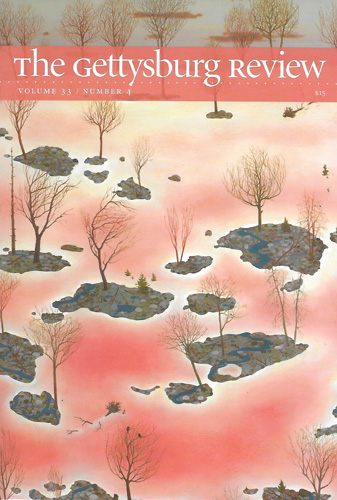 The Gettysburg Review Autumn 2016 issue features The Letter A, detail by Alexandra Tyng, 2012, oil on linen. The publication also includes a full-color portfolio of eight of his works.
The Gettysburg Review Autumn 2016 issue features The Letter A, detail by Alexandra Tyng, 2012, oil on linen. The publication also includes a full-color portfolio of eight of his works.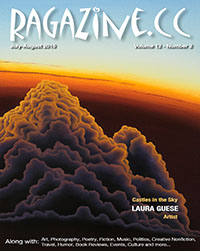 The online publication Ragazine features Castles in the Sky, oil on watercolor paper by Laura Guese, and also includes an interview with her in the issue here.
The online publication Ragazine features Castles in the Sky, oil on watercolor paper by Laura Guese, and also includes an interview with her in the issue here.
Spread the word!
Big Muddy 2016 Contest Winners
Big Muddy: A Journal of the MIssissippi River Valley volume 16.1 features winners of two of Southeast Missouri State University Press‘s annual contests:
2016 Wilda Hearne Flash Fiction Award
$500 + publication
“The Mockingbird” by John Blair, Texas
2016 Mighty River Short Story Award
$1000 + publication
“Teachers” by Elisabeth Doyle, Washington, DC
